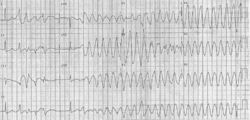Torsade de Pointes
| This is part of: Ventricular Arrhythmias |
| {{{locatieafbeelding}}} | |
| Atrial rate | 60-100 bpm |
| Ventricular rate | 150-300 bpm |
| Regularity | regular |
| Origin | ventricles |
| P-wave | AV-dissociation |
| Effect of adenosine | no rate reduction (sometimes accelerates) |
| Example ECG: An example of Torsade de Pointes. A normal sinus beat is followed by a ventricular extrasystole (shortly after the sinus beat), the compensatory pause results in a longer interval to the next beat. This longer beat therefore has a longer QT interval. The next beat follows shortly therafter, withing the QT interval. Not all ventricular cells have been repolarized by that time and a ventricular arrhythmia results. This short-long-short sequence is typical for Torsades de pointes. | |
Example ECG2: A twelve lead registration of Torsade de pointes. Reprinted with permission Copyright 2001 Texas Heart Institute Khan 
| |
Torsade de pointes is a ventricular tachycardia associated with a long QT time on the resting ECG. Torsade de pointes is typically initiated by a short-long-short interval. A ventricle extrasystole (first beat: short) is followed by a compensatory pause. The following beat (second beat: long) has a longer QT interval. If the next beat follows shortly thereafter, ther is a good chance that this third beat falls within the QT interval, resulting in the R on T phenomenon and subsequent Torsades de pointes. During Torsades de pointes the ventricles depolarize in a circular fashion resulting in QRS complexes with a continuously turning heart axis around the baseline (hence the name Torsade de Pointes). Read the chapter on the Long QT syndrome for an list of causes.
There has been much debate in the Circulation journal among French and American scientist whether one should write Torsades de Pointes or Torsade de Pointes. As for now Torsade is prefered (unless one sees rotations around more than one axis in one episode).Moise
References
<biblio>
- Moise pmid=10500317
</biblio>